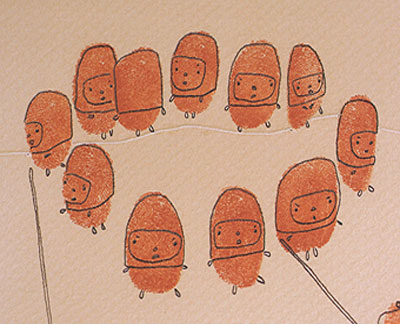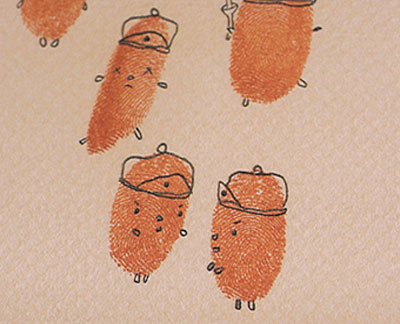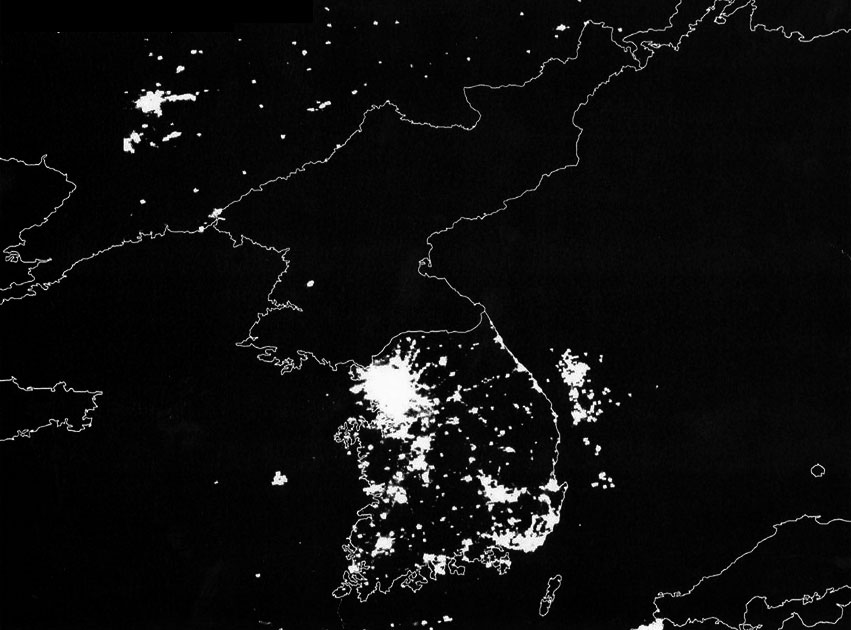
Facsimile Magazine, Published by Haoyan of America. Volume Four, Number Two, 2010. ISSN 1937-2116.
Facsimile Feburary 2010


Facsimile Magazine, Published by Haoyan of America. Volume Four, Number Two, 2010. ISSN 1937-2116.

A little soldier who discovers with contempt that one must live one's life, that a woman is a woman and that in a new world one must live as an outsider in order not to find oneself breathless.
- Jean-Luc Godard
Foreword by Charles S. Terry from No Surrender: My Thirty-Year War, Tokyo, October 7, 1974

Src: Wikipedia (February 2010)
Second Lieutenant Hiroo Onoda (小野田 寛郎 Onoda Hirō; born March 19, 1922) is a former Japanese army intelligence officer who fought in World War II, and did not surrender until 1974, having spent almost thirty years holding out in the Philippines.
Though he had killed some thirty Philippine inhabitants of the island and engaged in several shootouts with the police, the circumstances of these events were taken into consideration, and Onoda received a pardon from President Ferdinand Marcos.
Lieutenant Hiroo Onada was officailly declared dead in December, 1959. At the time it was thought that he and his comrade Kinshichi Kozuka had died of wounds sustained five years earlier in a skirmish with Philippine troops. A six-month search organized by the Japanese Ministry of Health and Welfare in early 1959 had uncovered no trace of the two men.
Then, in 1972 Onoda and Kozuka surfaced, and Kozuka was killed in an encounter with Philippine police. In the following half year, three Japanese search parties attempted to persuade Onoda tocome out of the jungle, but the only response they received was a thank-you note for some gifts they left. This at least established that he was alive. Owing partly to his reluctance to appear, he became something of a legend in Japan.
In early 1974, an amiable Japanese university dropout named Suzuki, who had tramped his way through some fifty countries contributing to the woes of numerous Japanese embassies, took it upon himself to make a journey through the Philippines, Malaysia, Singapore, Burma, Nepal and other countries that might occur to him en route. When he left Japan, he told his friends that he was going to look for Lieutenant Onoda, a panda and the Abominable Snowman, in that order. Presumably the panda and the Snowman are still waiting, because after only four days on Lubang, Suzuki found Onoda and persuaded him to meet with a delegation from Japan, which Suzuki undertook to summon.
Reports of Suzuki's meeting with Onoda touched off some of the most extravagant news coverage ever provided by Japanese press and television. People tended for a while to doubt Suzuki, but a mission was quickly dispatched to the Philippines to check on his story. Accompanying the mission were no fewer than one hundred Japanese newsmen.
There are several theories as to why the reappearance of Onoda created such a stir. Mine is that Onoda showed signs of being something that defeat in World War II had deprived Japan of: a genuine war hero. Similar excitement had arisen over earlier returnees. Only a year earlier, Sergeant Shōichi Yokoi had come home from Guam amid great fanfare. Now, however, nobody could conceal the feeling that Yokoi was a rather ordinary man--too ordinary to serve as a hero, perhaps Lieutenant Onoda would be the real thing.
It became apparent after his surrender that Onoda was intelligent, articulate, strong willed and stoic. This is the way the Japanese like their heroes to be, and in the three weeks between his first contact with Suzuki and his being received by President Ferdinand Marcos, news coverage in Japan swelled to the proportions of a deluge. When Onoda arrived back in Japan, he was received like a triumphant general. Norio Suzuki, for his part, was promoted in one jump from adventurer to assistant hero.
Normally I am almost completely immune to heroes and the adoration thereof. I also tend to be put off by publicity. Mr. Onoda himself was quoted in the newspaper I read as having said he was no hero, and I was prepared to accept that at face value.
When they told me his plane would land in Tokyo at four thirty in the afternoon, my reaction was, "Well, what's to prevent it?"
Still, I am human, and when the time arrived, I put my work aside and sat in front of the set like everybody else. And when I saw this small-dignified man emerge from the plane, bow, and then stand rigidly at attention for his ovation, I suddenly realized that he was something I had not seen-a man who was still living in 1944! Or at least only a few days out of it. A man who for the past thirty years must have been carrying around in his head the forgotten wartime propaganda of those times. Odd thoughts ran through my mind. Should I try to meet him, or had somebody else already proved to him that the American devils had no tails? Could he even now be counted upon not to commit harakiri in the palace plaza? How would he react to a Japan that is so radically different, on the surface at least, from what it was in 1944?
In short, I was hooked. With the rest of the nation I was drawn to the box off and on for a couple of weeks, watching Lieutenant Onoda greet his father and friends, Lieutenant Onoda in his hotel, Lieutenant Onoda going to the hospital for his checkup, Lieutenant Onoda having his breakfast, Lieutenant Onoda leaving Tokyo for his hometown in Wakayama Prefecture. I did not even object when the seven o'clock news on the day of his arrival gave Lieutenant Onoda's reunion with his mother top billing over an attempted hijacking then going on over our heads in Tokyo.
It became clear to me that Onoda was no ordinary straggler, but a man of strong determination and principle. Though slight of build, he looks the part of the stern, slightly pompous Japanese army officer of bygone times. I strongly felt that if he had stayed on Lubang for thirty years, he had done so for a definite reason. I wondered what it was, and what the psychology behind it was.
Even as we were all watching the television, Japanese publishers were scrambling for the rights to Onoda's story. He astonished most of them by turning down some of the more handsome offers and choosing a publisher whom he admired because of its youth magazines, which he had enjoyed in prewar times. After meeting and talking with Onoda, it seemed to me that this decision was typical of him, for the sternness that kept him on Lubang is tempered by gentleness and nostalgia for his younger, carefree days. I personally wonder whether it was not this side of his personality that caused him to yield to a happy-go-lucky but obviously sincere Japanese youth, when he had held out against all the others.
Onoda kept neither diary nor journal, but his memory is phenomenal. Within three months of his return, he had dictated two thousand pages of recollections ranging from the most important events to the tiniest details of jungle life. In July, 1974, articles began running in serial form in the weekly Shūkan Gendai. Simultaneously preparations were going on for book versions in both Japanese and English, and inquiries were beginning to come in from publishers abroad.
In the course of making the English translation, I had occasion to question Onoda on a number of points, and I was amazed at the vividness with which he could describe what had taken place at a given time or how he had made some article of clothing. He himself made sketches for all of the diagrams and drawings in this book, as well as for many others appearing in a Japanese children's edition.
In preparing the English text, I received much assistance not only from Mr. Onoda himself but from the editorial staff at Kodansha International, who edited my translation with great care and patience.
At the end of his book, Onoda asks himself what he had been fighting for all these years. My opinion is that it was for integrity. Whether Onoda continues to be regarded as a hero is for the future to decide, but I suspect he will, because in the end he won his war.
By Hiroo Onoda from No Surrender: My Thirty-Year War, 1974

Lubang island light house. Photo by Jeff Carmona
I hid in the bushes, waiting for the time to pass. It was a little before noon on March 9, 1974, and I was on a slope about two hours away from Wakayama Point. My plan was to wait until the time of the evening when it is still just possible to tell one face from another and then approach Wakayama Point rapidly, in a single maneuver. Too much light would mean danger, but if it were too dark, I would not be able to make sure that the person I was meeting was really Major Taniguchi. Also, late twilight would be a good time for making a getaway, if I should have to.
Just after two in the afternoon, I crept cautiously out of my hiding place and crossed the river above the point. Making my way through a grove of palms that ran along the river, I soon came to an area where the islanders cut trees for building.
At the edge of a clearing, I stopped and looked the place over. I could see nobody around. I supposed that the workers must be taking the day off, but to be on the safe side, I camouflaged myself with sticks and dried leaves before dashing across the shelterless area.
I crossed the Agcawayan River and reached a position about three hundred yards from the appointed spot. It was only about four o'clock, so I still had plenty of time. I changed to a camouflage of fresh leaves. There used to be paddy fields at the point, but now it is a grassy plain with a palm tree here and there. Along the river grow bamboo and shrubs.
I started up a little hill from which I would be able not only to look down on the point but to keep an eye on the surroundings. This was the place where I had met and talked with Norio Suzuki two weeks before. Just two days earlier a message from Suzuki asking me to meet him here again had been left in the message box we had agreed on, and I had come. I was still afraid it might be a trap. If it was, the enemy might be waiting for me on the hill.
I proceeded with the utmost caution but saw no signs of life. At the top of the hill, I peered out from among the trees and bushes, and on the edge of the point, where Suzuki had put up his mosquito net, I saw a yellow tent. I could make out a Japanese flag waving above it, but I could not see anybody. Were they resting in the tent? Or were they hiding somewhere else waiting for me to show up?
After thirty tense minutes, during which there was no change, I came down the slope and approached a spot only about one hundred yards from the tent. I shifted my position a little to get a different view, but still I saw no one. I decided they must be in the tent and settled down to wait for sunset.
The sun began to sink. I inspected my rifle and retied my boots. I was confident: I could have walked to the tent with my eyes shut, and I felt strong because I had rested while keeping watch. I jumped over a barbed-wire fence and made for the shade of a nearby bosa tree, where I paused, took a deep breath, and looked at the tent again. All was still quiet.
The time came. I gripped my rifle, thrust out my chest, and walked forward into the open.
Suzuki was standing with his back to me, between the tent and a fireplace they had rigged up by the riverbank. Slowly he turned around, and when he saw me, he came toward me with arms outstretched.
"It's Onoda!" he shouted. "Major Taniguchi, it's Onoda!"
In the tent, a shadow moved, but I went forward anyway. Suzuki, eyes bursting with excitement, ran up to me and with both hands clasped my left hand. I stopped about ten yards from the tent, from which there came a voice.
"Is it really you, Onoda? I'll be with you in a minute."
I could tell from the voice that it was Major Taniguchi. Motionless, I waited for him to appear. Suzuki stuck his head in the tent and brought out a camera. From inside, the major, who was shirtless, looked out and said, "I'm changing my clothes. Wait just a minute."
The head disappeared, but in a few moments Major Taniguchi emerged from the tent fully clothed and with an army cap on his head. Taut down to my fingertips, I barked out, "Lieutenant Onoda, Sir, reporting for orders."
"Good for you!" he said, walking up to me and patting me lightly on the left shoulder. "I've brought you these from the Ministry of Health and Welfare."
He handed me a pack of cigarettes with the chrysanthemum crest of the emperor on them. I accepted it and, holding it up before me in proper respect for the emperor, fell back two or three paces. At a little distance, Suzuki was standing ready with his camera.
Major Taniguchi said, "I shall read your orders."
I held my breath as he began to read from a document that he held up formally with both hands. In rather low tones, he read, "Command from Headquarters, Fourteenth Area Army" and then continued more firmly and in a louder voice: "Orders from the Special Squadron, Chief of Staff's Headquarters, Bekabak, September 19, 1900 hours.
"1. In accordance with the Imperial Command, the Fourteenth Area Army has ceased all combat activity.
"2. In accordance with Military Headquarters Command No. A-2003, the Special Squadron in the Chief of Staff's Headquarters is relieved of all military duties.
"3. Units and individuals under the command of the Special Squadron are to cease military activities and operations immediately and place themselves under the command of the nearest superior officer. When no officer can be found, they are to communicate with the American or Philippine forces and follow their directives.
"Special Squadron, Chief of Staff's Headquarters, Fourteenth Area Army, Major Yoshimi Taniguchi."
After reading this, Major Taniguchi paused slightly, then added, "That is all."
I stood quite still, waiting for what was to follow. I felt sure Major Taniguchi would come up to me and whisper, "That was so much talk. I will tell you your real orders later." After all, Suzuki was present, and the major could not talk to me confidentially in front of him.
I watched the major closely. He merely looked back rather stiffly. Seconds passed, but still he said no more. The pack on my back suddenly seemed very heavy.
Major Taniguchi slowly folded up the order, and for the first time I realized that no subterfuge was involved. This was no trick-everything I had heard was real. There was no secret message.
The pack became still heavier.
We really lost the war! How could they have been so sloppy?
Suddenly everything went black. A storm raged inside me. I felt like a fool for having been so tense and cautious on the way here. Worse that that, what had I been doing for all these years?
Gradually the storm subsided, and for the first time I really understood: my thirty years as a guerrilla fighter for the Japanese army were abruptly finished. This was the end.
I pulled back the bolt on my rifle and unloaded the bullets.
"It must have been a struggle," said Major Taniguchi. "Relax, take it easy."
I eased off the pack that I always carried with me and laid the gun on top of it. Would I really have no more use for this rifle that I had polished and cared for like a baby all these years? Or Kozuka's rifle, which I had hidden in a crevice in the rocks? Had the war really ended thirty years ago? If it had, what had Shimada and Kozuka died for? If what was happening was true, wouldn't it have been better if I had died with them?
I walked slowly after Major Taniguchi into the tent.
That night I did not sleep at all. Once inside the tent, I began giving a report of my reconnaissance and military activity during thirty years on Lubang-a detailed field report. Occasionally Major Taniguchi put in a word or two, but for the most part he listened attentively, nodding now and then in agreement or sympathy.
As coolly as possible I reported one event after another, but as I talked, emotion began to overcome me, and when I got to the parts about Shimada and Kozuka dying, I faltered several times. Major Taniguchi blinked as though holding back tears. The only thing that saved me from breaking down completely was the steady snoring of young Suzuki, who had drunk a good deal of sake before going to sleep on his cot.
Before I started my report, Suzuki had asked the major whether he should tell the other searchers that I had turned up. The major told him not to, because if lie reported, we would immediately be besieged by a great crowd of people. Suzuki signaled "no change," and I proceeded to talk to the major until dawn.
Several times he ordered me to go to bed and tell him the rest tomorrow, but although I tried this two or three times, each time I was up again in less than ten minutes. How could I sleep at a time like this? I had to tell him everything then and there.
Finally I reached the end of the story, and the major said, "Now let's get some sleep. It will only be an hour or so before the sun is really up. We have a rough day in front of us, and even an hour will help." He must have been relieved that the search was over, because he was snoring seconds after he lay down.
I was not. After sleeping outdoors where best I could for all these years, I could not get used to the cot. I closed my eyes, but I was more awake than ever. Like it or not, 1 had to go over in my mind all the events that had brought me to this tent.
From Time Magazine, Sep 28, 1942
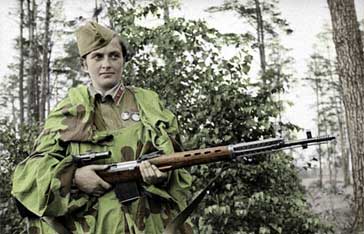
From Wikipedia (January 2010)
Lyudmila Mikhailivna Pavlichenko (Ukrainian: Людмила Михайлівна Павліченко; Russian: Людмила Михайловна Павличенко) was a Soviet sniper during World War II, credited with 309 kills, and is regarded as the most successful female sniper in history.
In June 1942, Pavlichenko was wounded by mortar fire. Because of her growing status, she was pulled from combat less than a month after recovering from her wound.
Pavlichenko was sent to Canada and the United States for a publicity visit and became the first Soviet citizen to be received by a U.S. President when Franklin Roosevelt welcomed her at the White House. Later, Pavlichenko was invited by Eleanor Roosevelt to tour America relating her experiences. While meeting with reporters in Washington she was dumbfounded about the kind of questions put to her.
Junior Lieut. Liudmila Pavlichenko, Russian Army girl sniper who killed 309 Germans, had to cancel a radio interview in Manhattan last week because a dentist pulled one of her front teeth and the resulting whistle would have been noticeable on the air waves. But in a non-radio interview with Commentator Alice Hughes, she gave her unvarnished opinion of the U.S. woman's angle on the war:
"I am amazed at the kind of questions put to me by the women press correspondents in Washington. Don't they know there is a war? They asked me silly questions such as do I use powder and rouge and nail polish and do I curl my hair? One reporter even criticized the length of the skirt of my uniform, saying that in America women wear shorter skirts and besides my uniform made me look fat.
"This made me angry. I wear my uniform with honor. It has the Order of Lenin on it. It has been covered with blood in battle. It is plain to see that with American women what is important is whether they wear silk underwear under their uniforms. What the uniform stands for, they have yet to learn."
In battle, Lieut. Pavlichenko commands men as well as women, wears trousers. But, she insists, she is a womanly sniper.
By Woody Guthrie, 1946
Fell by your gun, fell by your gun
Three hundred nazis fell by your gun
Fell by your gun, fell by your gun
More than three hundred nazis fell by your gun
Miss Pavlichenkoo's well known to fame,
Russia's your country, fighting is your game,
The whole world will love you for a long time to come,
Three hundred nazis fell by your gun
Fell by your gun, fell by your gun
More than three hundred nazis fell by your gun
Fell by your gun, fell by your gun
More than three hundred nazis fell by your gun
In the mountains and canyons quiet as a deer,
Down in the forest knowing no fear,
Lift up your sight, down comes a hun,
Three hundred nazis fell by your gun
Fell by your gun, fell by your gun
Three hundred nazis fell by your gun
Fell by your gun, fell by your gun
More than three hundred nazis fell by your gun
The hot summer's heat, or the cold winter's snow,
All kinds of weather you track down the foe,
Your face is as bright as the new morning sun,
But more than three hundred nazis fell by your gun
Fell by your gun, fell by your gun
More than three hundred nazis fell by your gun
Fell by your gun, fell by your gun
More than three hundred nazis fell by your gun
By E. W. Barton-Wright, from Pearson's Magazine, January 1901
Src: Zapato Productions intradimensional
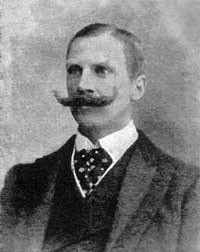
It must be understood that the new art of self-defence with a walking-stick, herewith introduced for the first time, differs essentially from single-stick or sword-play; for a man may be a champion in the use of sword or single-stick, and yet be quite unable to put a walking-stick to any effective use as a weapon of defence. The simple and sufficient reason to account for this is that both in single-stick and sword-play a cut is always taken up by the hilt of the weapon, whereas if you attempted to guard a blow with a walking-stick—which has no hilt—in the same way as you would with a sword, the blow would slide down your stick on to your hand and disable you. Therefore, in order to make a stick a real means of self-defence, it has been necessary to devise a system by which one can guard a blow in such a way as to cause it to slide away from the hand instead of toward it, and thus obviate the risk of being disarmed by being hit upon the fingers.
After some fifteen years of hard work, such a system has been devised by a Swiss professor of arms, M. Vigny. It has recently been assimilated by me into my system of self-defence called "Bartitsu."
In the art of self-defence with a walking-stick, the stick is held in the hand with the thumb overlapping the fingers, and not, as in single-stick or sword-play, with the thumb resting on the blade. The stick is therefore manipulated with the wrist—and not with the fingers as in sword-play—and the blows are given by swinging the body on the hips,— and not merely by flips from the elbow. In this way blows can be made so formidable that with an ordinary malacca cane it is possible to sever a man's jugular vein through the collar of his overcoat.
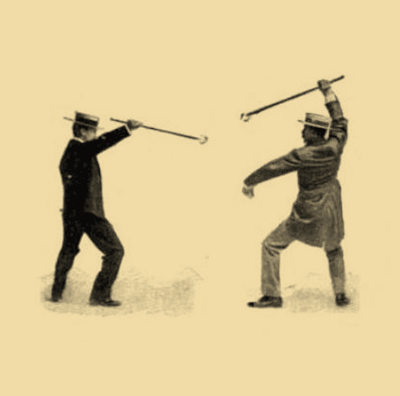
Your opponent, encouraged by the apparently exposed position of your left arm, naturally strikes at it, but you, anticipating the attack, withdraw it very quickly, and swing it upwards behind you. This upward sweep of the arm automatically causes you to swing your left foot well behind your right, and to draw in the lower part of your body out of your opponent's reach: at the same time it imparts the initial momentum to your right arm, and assists in bringing your stick down very quickly and heavily upon your adversary's head before he has time to recover his balance after over-reaching himself in trying to hit you.

Imagine that you are walking in a lonely part of the country, carrying a light switch or an umbrella, when suddenly a foot-pad bars your way, carrying a stout stick, with which he threatens you.
It is obvious that under these conditions if you gave your assailant time to assume the offensive, he would have no difficulty in breakingdown any slight guard you might offer, and in felling you to the ground. Knowing this disadvantage, and without giving him time to realise it, you must at once attack.
You should aim a vicious blow at your assailant's head, holding your hand very high in order to lorce him to guard high. Simultaneously, you should jump forward from the attacking position, shown in the second photograph, to the position shown in the third photograph, and strike him with the open hand high up on the chest, pulling his foot away from beneath him at the same time—in order to disturb his balance, and destroy his power to hit you. You could now strike your adversary such a blow with your fist on the face as to render him unconscious, or, of course, you could belabor him with your stick if it were suitable for the purpose.
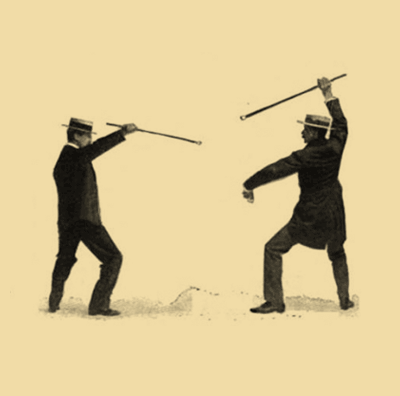
A tall, slow-moving man. attacked by a quick, short opponent, is at an immense disadvantage, as the short man delivers his attacks at lightning speed in unexpected quarters, and so reduces any possible advantage the other may hold in size and reach. Under the circumstances it would be advisable for the tall man to try to induce his opponent to deliver a blow for which he will be fully prepared.
This he will best do by taking up the rear-guard position, standing with his left foot forward, left arm extended, and right arm above the head, as previously described. He then throws his left arm forward as a bait. In ninety-nine cases out of a hundred the bait will prove irresistible. No sooner, however, does the short man begin to move his stick, with the intention of bringing it across the tall man's arm, than the latter must jump within the former's guard, in order to break the force of his blow as it falls, then, seizing the other's stick, the tall man can belabor his opponent's head.
Of course, it is understood that if the tall man has only got a weak stick or umbrella in his hand, which would only be of use in making the necessary feint to get an opening, directly he obtained the advantage shown in photo No. 2, he would use his fist to strike his opponent in the face or over the heart in order to disable him.
Released by the Board of Information, December 8, 1941. Japan Times & Advertiser
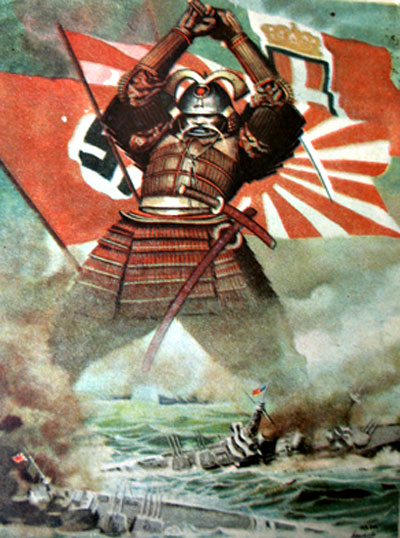
World War 2 propaganda postcard showing 'Axis' forces – Japan, Germany and Italy. Src: NSW Migration Heritage Centre
By the grace of Heaven, Emperor of Japan [Emperor Shōwa], seated on the throne occupied by the same dynasty from time immemorial, enjoin upon ye, Our loyal and brave subjects:
We hereby declare War on the United States of America and the British Empire. The men and officers of Our Army and Navy shall do their utmost in prosecuting the war. Our public servants of various departments shall perform faithfully and diligently their respective duties; the entire nation with a united will shall mobilize their total strength so that nothing will miscarry in the attainment of Our war aims.
To insure the stability of East Asia and to contribute to world peace is the far-sighted policy which was formulated by Our Great Illustrious Imperial Grandsire [Emperor Meiji] and Our Great Imperial Sire succeeding Him [Emperor Taishō], and which We lay constantly to heart. To cultivate friendship among nations and to enjoy prosperity in common with all nations, has always been the guiding principle of Our Empire's foreign policy. It has been truly unavoidable and far from Our wishes that Our Empire has been brought to cross swords with America and Britain. More than four years have passed since China, failing to comprehend the true intentions of Our Empire, and recklessly courting trouble, disturbed the peace of East Asia and compelled Our Empire to take up arms. Although there has been reestablished the National Government of China, with which Japan had effected neighborly intercourse and cooperation, the regime which has survived in Chungking, relying upon American and British protection, still continues its fratricidal opposition. Eager for the realization of their inordinate ambition to dominate the Orient, both America and Britain, giving support to the Chungking regime, have aggravated the disturbances in East Asia. Moreover these two Powers, inducing other countries to follow suit, increased military preparations on all sides of Our Empire to challenge Us. They have obstructed by every means Our peaceful commerce and finally resorted to a direct severance of economic relations, menacing gravely the existence of Our Empire. Patiently have We waited and long have We endured, in the hope that Our government might retrieve the situation in peace. But Our adversaries, showing not the least spirit of conciliation, have unduly delayed a settlement; and in the meantime they have intensified the economic and political pressure to compel thereby Our Empire to submission. This trend of affairs, would, if left unchecked, not only nullify Our Empire's efforts of many years for the sake of the stabilization of East Asia, but also endanger the very existence of Our nation. The situation being such as it is, Our Empire, for its existence and self-defense has no other recourse but to appeal to arms and to crush every obstacle in its path.
The hallowed spirits of Our Imperial Ancestors guarding Us from above, We rely upon the loyalty and courage of Our subjects in Our confident expectation that the task bequeathed by Our forefathers will be carried forward and that the sources of evil will be speedily eradicated and an enduring peace immutably established in East Asia, preserving thereby the glory of Our Empire.
In witness whereof, we have hereunto set our hand and caused the Grand Seal of the Empire to be affixed at the Imperial Palace, Tokyo, this seventh day of the 12th month of the 15th year of Shōwa, corresponding to the 2,652nd year from the accession to the throne of Emperor Jimmu.
By Peter J. Ognibene, from Playboy August 1977
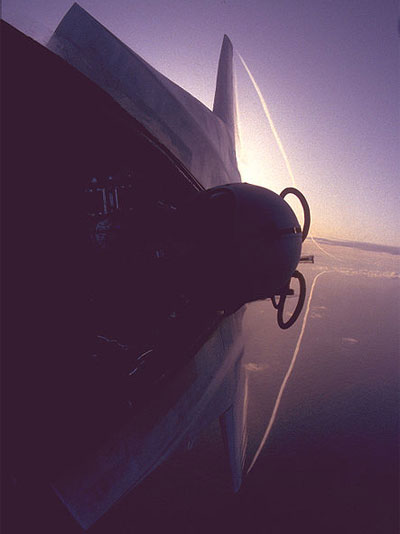
TOPGUN F-14 Tomcat, 1992. Photo by Dean Garner
Twelve years ago, India and Pakistan were lighting over the Rann of Kutch, which is without a doubt the most worthless piece of real estate on earth. Rann means marsh, which is what the Rann of Kutch is half the year. It's a desert the other six months.
But what made that miserable little war even more absurd was the fact that Indians and Pakistanis were killing one another with American weapons.
Did we learn from the Rann of Kutch? Apparently not, because in three conflicts in Latin America, the soldiers on both sides went into battle with blood in their eye and rifles stamped u.s. Greeks and Turks, who have been killing one another for centuries with little outside assistance, dispatched one another more efficiently in Cyprus, thanks to Uncle Sam, the world's number-one purveyor of high-velocity, hollow-point, impact-expanding ammunition and other military marvels with which mankind can liquefy flesh and pulverize bone.
In the past three decades, 110 billion dollars' worth of weapons have crossed national borders. The United States has been the undisputed leader in arms traffic, accounting for approximately half of all transnational transactions. The Soviet Union is running second.
For many years, we gave weapons to our allies: primarily western Europe and Israel. Now the name of the game is: Sell, sell, sell! In 1970, American arms sales totaled less than a billion dollars, but business has has boomed since then. In each of the past three years, American firms have peddled about ten billion doIlars' worth of weapons abroad. Iran and Saudi Arabia are now our customers.
In the volatile Middle East, the United States has been arming both sides with some of the most expensive and lethal weapons in our arsenal. Israel, for instance, will be getting F-15s, the frontline fighter of the U.S. Air Force. But Saudi Arabian petrodollars will be buying Sidewinder missiles that might one day be used to knock Israeli planes out of the sky. Should war come once again to that troubled region, the only outcome that's certain is that American industries will be doing brisk reorder business on both sides.
And what is our sales policy? William Proxmire, the maverick Senator from Wisconsin, probably said it best:
"We sell to anyone for any reason at any time. We arm neighbors. We arm enemies. We arm the wealthy, the destitute. We arm the despots, the dictatorships, the military juntas, the aristocracies-we arm them all."
Arms sales abroad create jobs at home, but there are also drawbacks to being number one. The United States, according to Pentagon documents, helped make Vietnam one of the most militarily powerful nations in Asia. We did not intend it that way. What happened was that the aid we shipped to what was then called South Vietnam managed to find its way into North Vietnamese hands.
Today, the shah of Iran is our biggest customer. Litton Industries is selling him Spruance-class destroyers that are better than those going to the U.S. Navy. He is also buying 80 F-14 fighters from Grumman that carry Phoenix, the most technologically advanced antiaircraft missile in existence. It can simultaneously track up to 24 enemy aircrafts and destroy them at a distance of 100 miles.
The Russians have nothing to compare with Phoenix and won't unless we sell it to them. Of course, if an Iranian pilot decided to defect, he wouldn't have to fly his F-14 very far before he crossed the Soviet border. What would happen then is anybody's guess. Perhaps Grumman would be allowed to sell the Russians spare parts.
From a military point of view, Iran does not need an airplane as sophisticated as the F-I4, but oil money has made it possible for the shah to buy just about anything he wants. Unfortunately, the United States, Europe and japan have been paying for his new toys through higher oil prices. And don't think they don't know it.
When a Grumman vice-president went to Iran in 1973 to firm up his company's deal, he cautioned an Iranian general that inflation could drive up the final price of the F-14s.
"Well, we don't worry about that," the general said with a smile. "If inflation comes, we just raise the price of oil."
Since that time, the price of oil has quadrupled. And who has been pushing the rest of the oil-producing nations to raise their prices even higher?
That's right: our favorite arms customer, Iran.
The price of oil is one problem: but it may be the least of our problems. Suppose the shah went to war. What then?
We now have nearly 20,000 Americans in Iran. By 1980, there could be as many as 60.000. These technicians are absolutely vital to Iran: Without them, the shahs troops would he unable to operate and maintain their complicated American weapons. Indeed, a study for the Senate Foreign Relations Committee concluded that Iran could not go to war "without U.S. support on a day-to-day basis."
We took our first step into Vietnam when we sent American "advisors" to show native troops how to use American weapons. Although the situation in Iran does not provide a perfect parallel--the shah is not at war; our advisors are civilians--the potential for danger is still there. Should Iran one day go to war, thousands of Americans would be caught in the middle. Pull them out and the Iranian military establishment would probably collapse for lack of technical support. Let them stay and Iran's enemy could properly regard them as "mercenaries." Either way, it's a no-win situalion for the United States.
A year ago (June 1976), one of the Presidential candidates asked: ''Can we be both the world's leading champion of peace and the world's leading supplier of the weapons of war?"
He paused, looked thoughtfully at his audience and then answered his own question in a soft Georgia drawl: "We cannot have it both ways."
Indeed, we cannot. And the man who posed that question, Jimmy Carter, now has the power to decide which way it will be.
Peter J. Ognibene is a New Republic contributing editor who writes about military and political affairs.
Opening Statement by William Crandell, 1st Marine Division, Winter Soldier Hearings, 1971
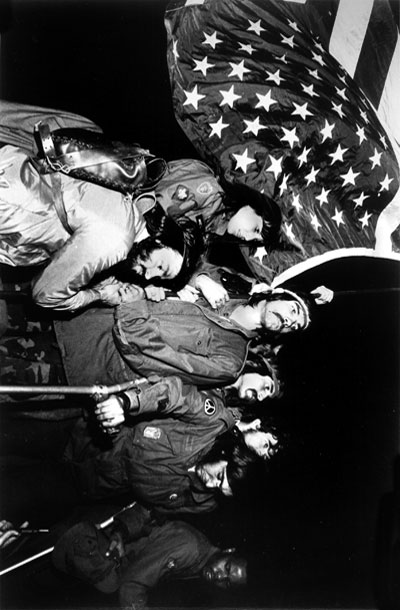
Winter Soldier (1972 Documentary) Courtesy Winterfilm Collective/Vietnam Veterans Against the War/Photofest (Rotated 90 degrees right)
"Over the border they send us to kill and to fight for a cause they've long ago forgotten." These lines of Paul Simon's recall to Vietnam veterans the causes for which we went to fight in Vietnam and the outrages we were part of because the men who sent us had long ago forgotten the meaning of the words.
We went to preserve the peace and our testimony will show that we have set all of Indochina aflame. We went to defend the Vietnamese people and our testimony will show that we are committing genocide against them. We went to fight for freedom and our testimony will show that we have turned Vietnam into a series of concentration camps.
We went to guarantee the right of self-determination to the people of South Vietnam and our testimony will show that we are forcing a corrupt and dictatorial government upon them. We went to work toward the brotherhood of man and our testimony will show that our strategy and tactics are permeated with racism. We went to protect America and our testimony will show why our country is being torn apart by what we are doing in Vietnam.
In the bleak winter of 1776 when the men who had enlisted in the summer were going home because the way was hard and their enlistments were over, Tom Paine wrote, "Those are the times that try men's souls. The summer soldier and the sunshine patriot will in this crisis shrink from the service of his country, but he that stands it now deserves the love and thanks of man and woman." Like the winter soldiers of 1776 who stayed after they had served their time, we veterans of Vietnam know that America is in grave danger. What threatens our country is not Redcoats or even Reds; it is our crimes that are destroying our national unity by separating those of our countrymen who deplore these acts from those of our countrymen who refuse to examine what is being done in America's name.
The Winter Soldier Investigation is not a mock trial. There will be no phony indictments; there will be no verdict against Uncle Sam. In these three days, over a hundred Vietnam veterans will present straightforward testimony-- direct testimony--about acts which are war crimes under international law. Acts which these men have seen and participated in. Acts which are the inexorable result of national policy. The vets will testify in panels arranged by the combat units in which they fought so that it will be easy to see the policy of each division and thus the larger policy. Each day there will be a special panel during the hours of testimony. Today, a panel on weaponry will explain the use and effects of some of the vicious and illegal weapons used in Vietnam. Tomorrow there will be a panel on prisoners of war composed of returned POWs, parents of a POW, American POW interrogators and vets who served in our own military stockades. Every witness throughout the three days will be available for cross-examination by the press after their initial statements and questioning by their fellow-vets who are acting as moderators.
We had also planned to present a panel of Vietnamese victims of the war who would testify by closed circuit television from Windsor, Canada. Last Wednesday, after we had spent a great deal of time and money arranging to bring these people to Windsor so that they could tell the people of the United States and Canada what we are doing to their country, the Canadian government denied them visas. We need not speculate upon the motives and policies of the Canadian government as our primary concern is with the motives and policies of our own government.
In addition there are two evening panels. Tonight at 7:30 a panel which includes Sid Peck and John Spellman will discuss what we are doing to Vietnam. Tomorrow night at 7:30 two psychiatrists, a lawyer, and three vets will discuss what we are doing to ourselves.
It has often been remarked but seldom remembered that war itself is a crime. Yet a war crime is more and other than war. It is an atrocity beyond the usual barbaric bounds of war. It is legal definition growing out of custom and tradition supported by every civilized nation in the world including our own. It is an act beyond the pale of acceptable actions even in war. Deliberate killing or torturing of prisoners of war is a war crime. Deliberate destruction without military purpose of civilian communities is a war crime. The use of certain arms and armaments and of gas is a war crime. The forcible relocation of population for any purpose is a war crime. All of these crimes have been committed by the U.S. Government over the past ten years in Indochina. An estimated one million South Vietnamese civilians have been killed because of these war crimes. A good portion of the reported 700,000 National Liberation Front and North Vietnamese soldiers killed have died as a result of these war crimes and no one knows how many North Vietnamese civilians, Cambodian civilians, and Laotian civilians have died as a result of these war crimes.
But we intend to tell more. We intend to tell who it was that gave us those orders; that created that policy; that set that standard of war bordering on full and final genocide. We intend to demonstrate that My Lai was no unusual occurrence, other than, perhaps, the number of victims killed all in one place, all at one time, all by one platoon of us. We intend to show that the policies of Americal Division which inevitably resulted in My Lai were the policies of other Army and Marine Divisions as well. We intend to show that war crimes in Vietnam did not start in March 1968, or in the village of Son My or with one Lt. William Calley. We intend to indict those really responsible for My Lai, for Vietnam, for attempted genocide. General Westmoreland said in 1966:
I'd like to say that let one fact be clear. As far as the U.S. Military Assistance Command in Vietnam is concerned, one mishap, one innocent civilian killed, one civilian wounded, or one dwelling needlessly destroyed is too many.
By its very nature war is destructive and historically civilians have suffered. But the war in Vietnam is different; it is designed by the insurgents and the aggressors to be fought among the people many of whom are not participants in or closely identified with the struggle. People more than terrain are the objectives in this war and we will not and cannot be callous about those people. We are sensitive to these incidents and want no more of them. If one does occur, mistake or accident, we intend to search it carefully for any lesson that will help us improve our procedures and our controls. We realize we have a great problem and I can assure you we are attacking it aggressively.
We need not judge Westmoreland's bland assurances nor need we pass responsibility for these crimes. You who hear or read our testimony will be able to conclude for yourselves who is responsible.
We are here to bear witness not against America, but against those policy makers who are perverting America. We echo Mark Twain's indictment of the war crimes committed during the Philippine insurrection:
We have invited our clean young men to soldier a discredited musket and do bandit's work under a flag which bandits have been accustomed to fear not to follow. We cannot conceal from ourselves that privately we are a little troubled about our uniform. It is one of our prides: it is acquainted with honor; it is familiar with great deeds and noble. We love it; we revere it. And so this errand it is on makes us uneasy. And our flag, another pride of ours, the chiefest. We have worshipped it so and when we have seen it in far lands, glimpsing it unexpectedly in that strange sky, waving its welcome and benediction to us, we have caught our breaths and uncovered our heads for a moment for the thought of what it was to us and the great ideals it stood for. Indeed, we must do something about these things. It is easily managed. We can have just our usual flag with the white stripes painted black and the stars replaced by the skull and crossbones. We are ready to let the testimony say it all.
Winter Soldier Investigation at The Sixties Project
Review by Eric, from Ground & Sky, 1981
In a possible attempt to regain former glory, Andy Latimer returned to the key to Camel's early success: the concept album. With The Snow Goose, Camel achieved their most critically and commercially acclaimed album. After a number of personnel changes, Latimer steered the band back to the ways of old. The story of Nude is based around a single character that goes off to war, gets separated from his unit during battle on an island, and ultimately is left for dead. Twenty-nine years later, he is discovered and returns a hero, but cannot adapt to the monotony of his new life and disappears last seen sailing out of the harbor in hopes of returning to the island.
Nude contains a few vocal based tracks (unlike the all instrumental Snow Goose), and synthesizers replace the more organic keyboard sounds of Bardens. Latimer has the ability to capture moods with his music, and as you follow through the story it is evident with multiple musical contrasts. Opening with a poppy vocal number, "City Life", the band quickly gets into instrumental territory. "Docks" is actually a song written by keyboardist Kit Watkins (Happy the Man) originally titled "Mount St. Helens", and Latimer attaches his own music to the second half. This one contains some slide guitar accompanying an interesting keyboard arrangement. The music tells the story by capturing various emotions of the character starting with "Drafted" reflecting the fear and sadness one might feel after receiving their notice.
The music tenses and swirls as the troops are being dropped onto the island ("Beached"). A very beautiful and melodic section takes over, seeming to reflect the peace and quiet after the battle ends in the jungle. Atmospheric and at times bordering on a new-agey feel, the flutes and koto (I believe) play over synths and pianos, creating a calm, relaxing ambience. A tribal percussive section maintains the peaceful feel running through the middle of the story, relating to the character's adaptation to life on the deserted jungle island. The instumental themes are short and very melodic.
My favorite of the instrumentals is the intense "Captured", featuring the sax of Mel Collins. There are a few themes that are repeated, giving a cohesive feel. The biggest disappointment is the lack of Latimer's lead guitar playing, though he shines on "Lies" and "City Life". At times bordering on new age, this is still the best Camel offering of the 80's, and it would be a long time before the band would return to form in the 90's.
For whatever reason, I'm pretty into playing thumb war. I rarely lose even with my non-elegant short fingers. These thumbprints are pretty serious about winning the fight, too. This series of thumb war battles was created by myself in 2006 and has been recently been made available as reproductions of the originals.

